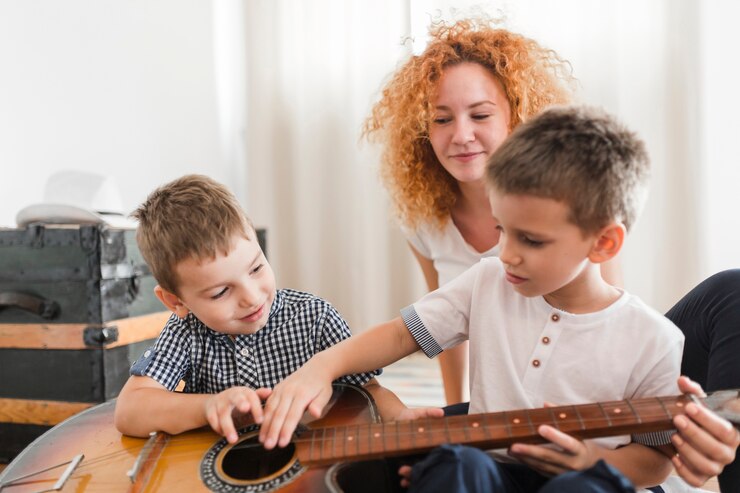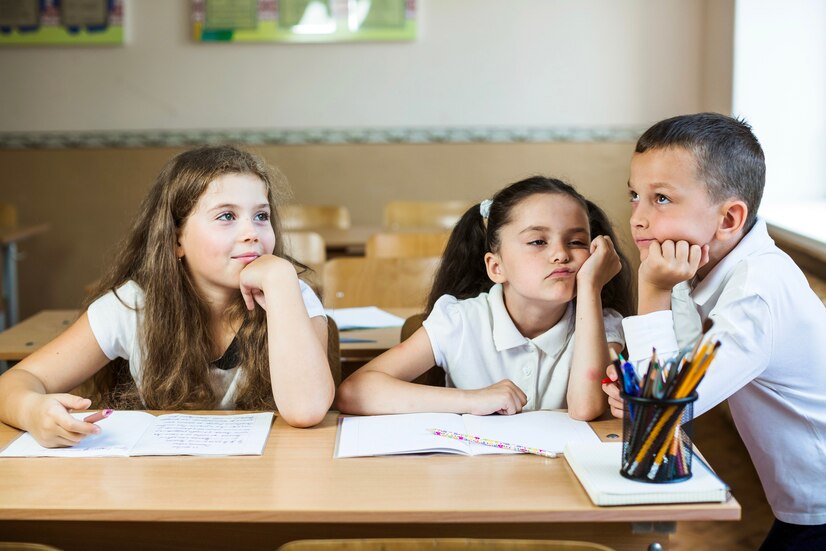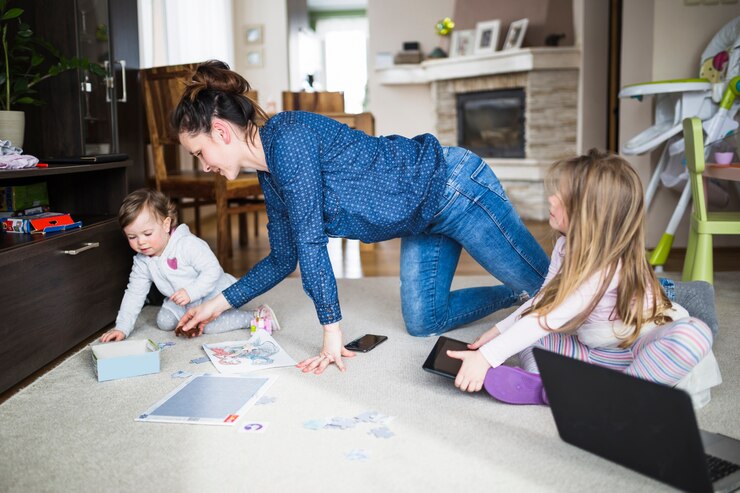Child Care
Crafting Melodies: Engaging Children with DIY Musical Instruments

Introducing children to the world of music can be both fun and educational, and one of the most creative ways to do this is crafting their DIY musical instruments. By building their instruments using everyday household items, kids gain a deeper understanding of how music is made while developing fine motor skills and learning about different sounds and tones. This interactive approach sparks a love for music and nurtures curiosity, innovation, and a sense of accomplishment.
Introduction to DIY Musical Instruments
Music holds a special place in human culture, captivating people across the globe with its emotional and rhythmic allure. For children, crafting homemade instruments offers a joyful way into this fascinating world, blending the joy of creation with the pleasure of sound. This hands-on approach aligns perfectly with the modern educational methods emphasizing experiential learning, where practical engagement facilitates understanding and retention much better than theoretical lessons.
Children benefit immensely from these musical crafts, as they provide recreational value and educational advantages. Through this engaging process, they learn how different sounds are produced and how various materials can be repurposed to create instruments. In a world increasingly aware of environmental sustainability, these projects also instill an appreciation for recycling and creative reuse of household items.
Benefits of Making Music with Homemade Instruments
Create-your-own instrument projects transcend mere entertainment; they are a conduit for holistic development in children. Homemade instruments for kids tap into a broad range of skills, from motor skills developed through manual crafting to heightened auditory discrimination as children explore different sounds. Engaging in musical creation enhances neural pathways associated with memory and comprehension, essential to effective learning.
Moreover, the interactive nature of crafting and playing together can boost emotional intelligence and resilience. Working alongside peers fosters cooperation and communication while overcoming challenges during crafting, which helps build problem-solving skills. Music also serves as an emotional outlet, providing children with a non-verbal way to express their feelings and creativity, promoting mental well-being and self-esteem.
Easy DIY Instrument Projects for Kids
The realm of DIY instruments is vast and varied, offering numerous projects to try. Here are some beginner-friendly instruments that kids can easily create and enjoy:
Crafting maracas, percussion drums, and kazoos is a simple and engaging activity for children. Maracas involve mixing materials like rice, pebbles, or dried beans, while drums are made from empty containers and decorated with paints or stickers. Kazoos are made from paper towel rolls, wax paper, and rubber bands, and they teach about vibration and sound waves.
These projects engage children’s creativity and provide a stepping stone to more complex musical understanding, laying the groundwork for future musical endeavors.
Supplies and Tools You’ll Need
The materials needed for crafting DIY instruments are mostly commonplace items, making it an accessible activity for most households. Here’s what you typically require:
- Recyclable containers such as jars, boxes, and cans can serve as the base for percussion instruments.
- Crafting tools like scissors and glue, alongside filler materials such as rice or beans for sound-making variations.
- Decorative supplies, such as paints, stickers, and markers, allow children to personalize their instruments, adding an artistic dimension to the craft.
Incorporating these everyday items into crafting kits keeps the cost down and introduces recycling concepts, teaching children the impact of their creative choices on the environment.
Teaching Rhythm and Melody with DIY Instruments
After the crafting phase, the new instruments transition from objects to educational tools. Introducing rhythm and melody through play can enrich a child’s musical vocabulary. Start by encouraging them to replicate simple beats or compose their rhythms using maracas or drums. This will facilitate an understanding of timing and tempo.
Engagement can be enhanced by creating sing-along sessions using kazoos and inviting family members to play different instruments, forming an impromptu orchestra. Such activities foster an inclusive environment where children learn music theory effortlessly, incorporating concepts like tempo, pitch, and harmony into their understanding.
Fostering Creativity Through Music
DIY musical projects are fertile ground for cultivating imagination. As children decide on the look and sound of their instruments, they exercise critical thinking skills and creativity. These tasks encourage youngsters to explore beyond standard methods, discover new approaches and solutions, and develop vital skills for their cognitive growth. Engaging with music creatively enhances problem-solving and critical-thinking skills, foundational for comprehensive brain development.
This creativity extends beyond the musical sphere, fueling a child’s imagination and often inspiring storytelling or dramatization, where their crafted instruments play a central role in their narratives.
Safety Tips for Crafting with Kids
Safety should always be a top priority when crafting with children. Here are several safety tips to ensure a fun and injury-free crafting experience:
- Active supervision is necessary, mainly when using sharp tools like scissors. Ensure that an adult is present to guide and assist when needed.
- Organize materials to prevent small items, which could pose choking hazards, from getting within easy reach of very young children.
- Use only non-toxic materials, especially when children are handling paints and adhesives, to protect them from potential allergic reactions or other health issues.
Children can explore their creativity freely and confidently by maintaining a safe crafting environment.
Encouraging Musical Exploration
After mastering the basics of rhythm and melody, encourage further musical exploration. You might establish routine family music sessions where each child performs with their instrument, creating a nurturing space for musical expression and growth. This structured yet playful environment serves to develop musical talents and build confidence.
Blending music with daily activities ultimately nurtures a lifelong love for this art form. Through exploration and discovery, children learn more about themselves and their world, making music a valuable educational tool in any home.
Child Care
Is Your Child’s Mattress the Secret to Their Behaviour?

When it comes to our children’s health and wellbeing, many parents often focus on nutrition, exercise, and mental stimulation. However, one crucial aspect that frequently goes overlooked is the quality of sleep that kids get, largely determined by their mattress. The type of kids bed your child sleeps on can significantly impact their behaviour, mood, and overall development. If your child seems irritable, struggles with focus, or has frequent meltdowns, it might be time to consider whether their childrens mattress is contributing to these issues.
The Importance of Sleep for Children
Sleep is not merely a passive state; it plays a vital role in a child’s physical and mental development. During sleep, children’s bodies repair and grow, and their brains process the information they have learned throughout the day. For kids, sleep is essential for healthy cognitive functioning, emotional regulation, and behavioural stability. Insufficient or poor-quality sleep can lead to a range of problems, including increased hyperactivity, difficulty concentrating, and mood swings.
Research indicates that children require more sleep than adults. Depending on their age, kids may need anywhere from 10 to 14 hours of sleep each night. A comfortable and supportive mattress can help ensure that your child is getting the quality sleep they need. If your child is tossing and turning or waking up frequently during the night, it may be a sign that their mattress isn’t meeting their needs.
Mattress Types and Their Impact
When selecting a kids bed, it’s important to consider the type of mattress that will provide the best support and comfort for your child. There are several types of mattresses available, each with its unique properties:
Innerspring Mattresses
These mattresses are made with a coil support system and tend to be more affordable. However, they may not provide the best support for growing children, especially if the coils are too firm or too soft. A lack of adequate support can lead to discomfort and restless nights, which could affect your child’s behaviour the next day.
Memory Foam Mattresses
Memory foam mattresses are designed to contour to the body, providing excellent support and pressure relief. This type of mattress can help ensure that your child’s spine remains aligned while they sleep, promoting better overall sleep quality. However, some memory foam mattresses can retain heat, which might disrupt sleep. If you choose a memory foam mattress, look for one with cooling features to help your child stay comfortable throughout the night.
Hybrid Mattresses
Hybrid mattresses combine the benefits of innerspring and memory foam mattresses. They often feature a coil support system with a layer of memory foam on top. This combination can provide the best of both worlds: adequate support and contouring comfort. A well-designed hybrid mattress can contribute to better sleep quality, which, in turn, can positively influence your child’s mood and behaviour.
The Link Between Sleep and Behaviour
Numerous studies have shown a clear connection between sleep quality and behaviour in children. Poor sleep can result in a range of behavioural issues, including irritability, impulsivity, and difficulty concentrating. A study published in the journal Sleep found that children with sleep problems were more likely to exhibit behavioural issues and emotional difficulties. Additionally, a lack of quality sleep can exacerbate conditions such as ADHD and anxiety.
If your child is experiencing difficulties at school or displaying disruptive behaviour at home, it might be worth evaluating their sleep environment. Is their kids bed providing the comfort and support they need? Are there distractions in the bedroom that could be affecting their sleep? These are important questions to consider when trying to understand the root cause of your child’s behaviour.
Signs Your Child’s Mattress May Be the Issue
It can be challenging to determine whether a mattress is contributing to your child’s sleep problems. However, there are some signs to look out for:
- Restlessness at Night: If your child frequently tosses and turns or struggles to find a comfortable position, their mattress may not be providing adequate support.
- Waking Up in Discomfort: If your child often wakes up complaining of aches and pains, it could indicate that their mattress is too firm or too soft for their needs.
- Frequent Nightmares or Night Terrors: While nightmares can be common among children, persistent sleep disturbances might suggest that your child is not getting restful sleep.
- Difficulty Waking Up: If your child is consistently tired in the morning and has trouble waking up, it may be a sign that they are not getting the quality sleep they require.
- Mood Swings or Behavioural Changes: If you notice a correlation between poor sleep and changes in your child’s behaviour, it could be a strong indicator that their mattress is a factor.
Creating the Ideal Sleep Environment
In addition to choosing the right kids bed, there are other factors that contribute to a conducive sleep environment. Consider the following tips:
- Limit Screen Time: Encourage your child to avoid screens for at least an hour before bedtime. The blue light emitted by screens can interfere with melatonin production, making it harder for them to fall asleep.
- Establish a Bedtime Routine: Creating a calming bedtime routine can help signal to your child that it’s time to wind down. Activities like reading a book or taking a warm bath can promote relaxation.
- Ensure a Comfortable Room Temperature: A room that is too hot or too cold can disrupt sleep. Aim for a comfortable temperature to create an ideal sleep environment.
- Minimise Noise and Light: Consider using blackout curtains to block out light and white noise machines to drown out distracting sounds. A quiet, dark environment can help your child sleep more soundly.
Ultimately, ensuring your child has a comfortable and supportive mattress is just one piece of the puzzle. However, it is a critical component that can significantly affect their sleep quality and overall behaviour. If you suspect that your child’s mattress may be contributing to their behavioural challenges, it might be time to explore new options and create a sleep environment that fosters rest and rejuvenation.
Child Care
Benefits of Enrolling Your Child in a Private Bilingual School in La Jolla

Are you considering the best educational environment for your child? Discover the advantages of choosing a private bilingual school in La Jolla, where language proficiency and cultural diversity enrich the learning experience. In this article, we will explore the benefits of enrolling your child in such a school.
Benefits of Private Bilingual Schools for Kids
Enhanced Cognitive Development
Bilingual private schools in La Jolla offer a unique advantage: they stimulate cognitive development through exposure to multiple languages from an early age. Research indicates that bilingualism enhances problem-solving skills and mental flexibility, giving children a cognitive edge that extends into adulthood. Exposing children to different languages encourages them to think critically, adapt to diverse communication styles, and improve their academic performance.
Cultural Awareness and Global Perspective
One significant benefit of a private bilingual school in La Jolla is its emphasis on cultural awareness and global perspective. Children develop a deeper understanding and appreciation of different cultures by learning a second language in an immersive environment.
Students gain empathy, respect, and a broader worldview through cultural events, language immersion programs, and interactions with peers from diverse backgrounds.
Academic Excellence and Future Opportunities
Private bilingual schools in La Jolla are well-known for their dedication to high academic standards and rigorous curriculum. By mastering more than one language, students often achieve higher scores on standardized tests and demonstrate superior academic performance compared to their monolingual peers. Bilingualism opens doors to future opportunities, from international careers to educational scholarships and cultural exchanges.
Personalized Attention and Small Class Sizes
Unlike public schools, private bilingual ones in La Jolla often boast smaller class sizes and a lower student-to-teacher ratio. In smaller classes, teachers can focus on developing solid relationships with students, providing timely feedback, and nurturing a supportive learning environment. This personalized approach fosters confidence, independence, and a genuine passion for learning among students.
Preparation for a Multilingual Workforce
Employers often seek candidates who can communicate fluently in multiple languages, as it enhances business prospects and opens doors to global career opportunities. Attending a private bilingual institute equips students with a competitive advantage in the job market and prepares them to thrive in a worldwide, multilingual work environment.
Strong Community and Parental Involvement
Private bilingual schools in La Jolla cultivate a vibrant community atmosphere and promote active parental engagement in their child’s educational journey. This partnership between educators, parents, and the community creates a supportive network that enhances the overall academic experience. Families become integral parts of the community through volunteer opportunities, parent-teacher associations, and school events.
Enhanced Communication Skills
A key advantage of enrolling your child in a private bilingual school in La Jolla is the development of enhanced communication skills. By learning to speak and write proficiently in multiple languages, students sharpen their ability to articulate thoughts clearly and effectively across different cultural contexts.
Bilingual education promotes linguistic flexibility, allowing students to express ideas creatively and persuasively in both their native and second languages.
Holistic Development Opportunities
Private bilingual schools in La Jolla offer holistic development opportunities that encompass academic excellence, cultural awareness, and interpersonal skills. These schools strive to cultivate well-rounded individuals who thrive not only academically but also socially and culturally. Through a curriculum that integrates language proficiency with global perspectives, students develop a deep understanding of diverse cultures and values. This exposure fosters empathy, tolerance, and respect for others, crucial qualities in today’s interconnected world.
Choosing a bilingual private school in La Jolla for your child offers numerous advantages. From enhanced cognitive abilities to a deeper understanding of global perspectives, the benefits of bilingual education are vast and enduring. Invest in your child’s future by enrolling them in a private school where they can thrive academically, socially, and culturally.
Child Care
The Power of Consistent Routines in Child Development

Creating and maintaining consistent routines can be a game-changer in your child’s life. From improving emotional stability to boosting cognitive development, routines offer numerous benefits that cater to the holistic growth of a child. This post will guide you through the importance of these routines, provide actionable steps to implement them, and discuss their long-term impact.
Why Are Consistent Routines Important?
Emotional Stability
Children thrive in environments where they know what to expect. Consistent routines provide a sense of security, leading to emotional stability. This stability helps reduce anxiety and stress, making children feel more comfortable and confident in their daily activities.
Cognitive Development
Structured routines can significantly enhance cognitive skills. When children know what comes next, they can focus better, leading to improved learning and memory retention. Whether it’s a morning ritual or bedtime routine, consistency aids cognitive development.
Behavioral Benefits
Consistency in daily activities helps manage behavior effectively. When children understand the expectations, they are less likely to act out. This predictability creates a harmonious environment that encourages positive behavior.
Morning Routines to Kickstart the Day
Structured Wake-Up Time
A consistent wake-up time sets the tone for the day. It helps regulate the body’s internal clock, making it easier for children to wake up and go to bed at the same time each day, promoting better sleep quality.
Healthy Breakfast Habits
Starting the day with a nutritious breakfast can boost energy levels and concentration. Incorporating a healthy eating routine teaches children the importance of good nutrition, a habit that will benefit them throughout their lives.
Preparing for School
A morning routine that includes preparing for school can make the transition smoother. Whether it’s packing the backpack or organizing school supplies, these tasks can enhance organizational skills and reduce morning chaos.
After-School Routines for Balanced Afternoons
Homework Time
Setting a specific time for homework can improve focus and academic performance. Consistency in this routine helps children develop a disciplined approach to their studies, making learning a natural part of their daily schedule.
Play and Relaxation
Balancing homework with playtime is crucial for overall development. Scheduled playtime allows children to unwind and engage in physical activities, essential for physical and mental well-being.
Family Time
Dedicating time for family activities can strengthen bonds and improve communication skills. Whether it’s a family game night or a simple dinner conversation, these moments build emotional connections and social skills.
Evening Routines to Wind Down the Day
Dinner Time
A scheduled dinner time promotes family bonding and healthy eating habits. It’s also an opportunity to discuss the day’s events, teaching children the value of communication and reflection.
Bedtime Rituals
Establishing a bedtime routine helps children wind down and prepare for sleep. Activities like reading a book or listening to calming music can signal the body that it’s time to rest, improving sleep quality and overall health.
Reflection and Gratitude
Encouraging children to reflect on their day and express gratitude can foster a positive mindset. This practice helps children appreciate the small joys in life, contributing to emotional well-being.
The Role of Routines in Social Skills Development
Group Activities
Participating in group activities teaches children the importance of teamwork and cooperation. Structured routines that include group play or team sports can enhance social skills and build friendships.
Manners and Etiquette
Consistent routines that emphasize manners and etiquette can shape a child’s character. Simple practices like saying “please” and “thank you” become second nature, fostering respectful behavior.
Community Engagement
Involving children in community activities can broaden their social horizons. Whether it’s volunteering or attending local events, these routines teach children the value of community and empathy.
How to Create Consistent Routines
Start Small
Begin with simple routines that are easy to implement. Gradually introduce more complex activities as the child adapts to the new schedule, ensuring a smooth transition.
Be Flexible
While consistency is key, it’s also important to be flexible. Life is unpredictable, and sometimes routines need to be adjusted. Adaptability ensures that routines remain effective without causing unnecessary stress.
Involve Your Child
Including your child in the planning process can make routines more enjoyable and effective. When children have a say in their daily activities, they are more likely to stick to the schedule.
The Long-Term Impact of Consistent Routines
Academic Success
Children who follow consistent routines tend to perform better academically. The discipline and focus cultivated through structured activities translate into better study habits and academic achievements.
Emotional Resilience
Consistent routines build emotional resilience, helping children cope with stress and challenges. The stability provided by routines acts as a buffer against life’s uncertainties, promoting mental health.
Lifelong Habits
The habits formed during childhood often last a lifetime. Consistent routines teach children the importance of organization, time management, and self-discipline, skills that are valuable in adulthood.
Conclusion
Establishing and maintaining consistent routines can have a profound impact on your child’s development. From emotional stability to academic success, the benefits are far-reaching. As you embark on this journey, remember that flexibility and involvement are key to creating routines that work for your family. For more personalized advice, consider reaching out to affordable childcare in Salt Lake City to help you tailor routines that fit your child’s unique needs.
-

 GENERAL2 years ago
GENERAL2 years agoDiscovering the Artistic Brilliance of Derpixon: A Deep Dive into their Animation and Illustration
-

 Posts2 years ago
Posts2 years agoSiegel, Cooper & Co.
-

 HEALTH2 years ago
HEALTH2 years agoTransformative Health Solutions: Unveiling the Breakthroughs of 10x Health
-

 Lifestyle2 years ago
Lifestyle2 years agoPurenudism.com: Unveiling the Beauty of Naturist Lifestyle
-

 FASHION2 years ago
FASHION2 years agoThe Many Faces of “λιβαισ”: A Comprehensive Guide to its Symbolism in Different Cultures
-

 Lifestyle2 years ago
Lifestyle2 years agoBaddieHub: Unleashing Confidence and Style in the Ultimate Gathering Spot for the Baddie Lifestyle
-

 Entertainment2 years ago
Entertainment2 years agoGeekzilla Podcast: Navigating the World of Pop Culture, Gaming, and Tech
-

 Lifestyle1 year ago
Lifestyle1 year agoSandra orlow: Unraveling the Story of an Iconic Figure
